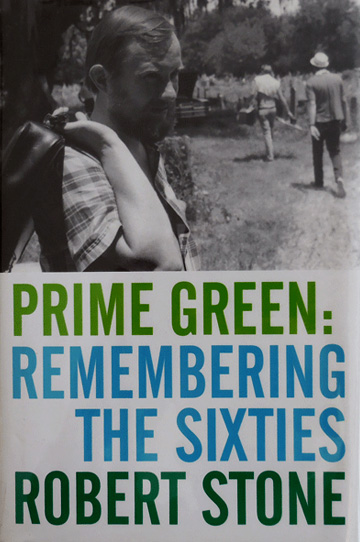
Prime Green
February 13, 2007 | Christian Science Monitor
If the ’60s were a jungle, then Robert Stone wore camouflage. In his new memoir, Prime Green: Remembering the Sixties, the celebrated novelist comes across as mild, unobjectionable, and moderate (considering) – a man living in but not always of the era.
Perhaps he was so steady because he was a veteran or maybe it was because he had a young family. “My closest friends seemed all in various ways involved with Maoism,” he writes. “No visible improvements seemed to be coming out of this, but it was good to see our friends again.”
Stone kept some impressive company during these years – Ken Kesey, Allen Ginsberg, Jack Kerouac – but one gets the sense that he laughed quietly while others roared, and that his best contributions came after the event, at the typewriter.
Although Vietnam looms on practically every page of “Prime Green,” this isn’t a political memoir. There’s no mention of race riots or Kent State, and the assassinations of Dr. King and the brothers Kennedy get only a few lines each. The book’s most conspicuous tie to the era (apart from heavy recreational abuse of drugs) is a handful of epic (ahem) journeys: hiking across the Santa Cruz Mountains while Neil Armstrong was making his footprints in lunar dust; hiding out in Mexico with Kesey, who was evading drug charges; riding from San Francisco to the 1964 World’s Fair in Flushing Meadows in a retrofitted bus called “Further.”
One of the great pleasures of “Prime Green” is the intimate glimpse it affords of Stone as a young writer. He published his first novel, “A Hall of Mirrors,” during these years, and the reader shares the anxieties and excitements of a real talent uneasily awaiting a breakthrough.
Stone’s prose is frequently compared to Hemingway’s – crossed with Vonnegut in oversized flak helmets, one might say – and he repeatedly invokes Papa in these pages for anecdotes and inspiration. Stone is no Hemingway, but he can be very good, and he has given us a thoughtful and sympathetic portrait of a contentious time.
“Prime Green” isn’t a righteous defense of the ’60s or an apologia for youthful antics; its author is wise enough to see that sometimes he and his friends were “clamorous and vain” and other times they were downright foolish. But they did have an enviable optimism, “an anticipation of the best in possibility,” and they knew how to write.